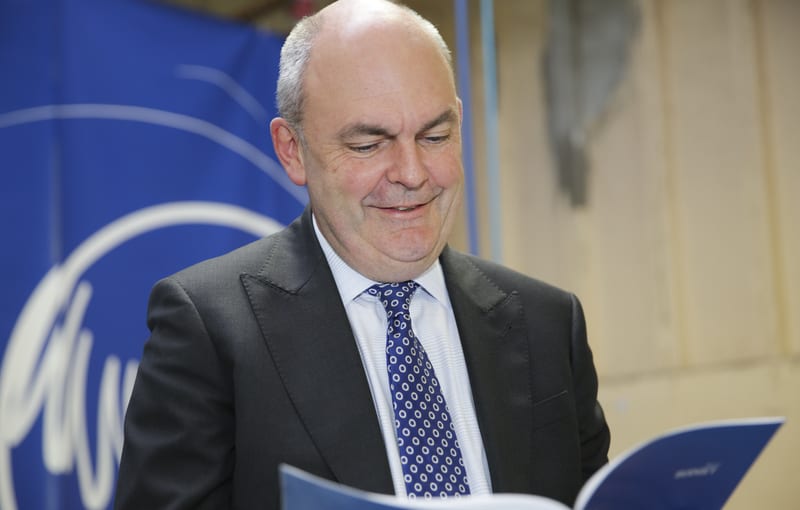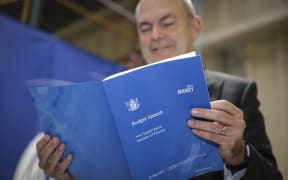Opinion - Budgets are not "lolly scrambles", especially when New Zealand households continue to struggle with a high debt burden, writes Rob Hosking.

Finance Minister Steve Joyce gets ready to open the books on the this year's plan. Photo: RNZ / Rebekah Parsons-King
"Lolly scramble." "Budget goodies." Does anyone else find these phrases irritating? Infantilising? Or even alarming?
Budgets are not magic boxes.
They're a set of priorities for the government of the day: they're also a chance for the opposition to highlight its own, presumably different, set of priorities.
But they are not "lolly scrambles" and finance ministers are not benign, big daddy Father Christmases doling out "goodies" to humble, grateful and, above all, childlike citizens.
It really is quite alarming the way in which we - or at least, far too much of the media - talk about budgets in this psychologically infantilising way.
In a way, it's an offshoot of the tradition from Westminster-derived democracies. There is not the theatre around the budget day in, say, the US Congress as there is in New Zealand, Australia, the United Kingdom or Canada.
Most obviously this is because it is a core part of the Westminster constitution that governments which cannot get budgets passed through Parliament cannot govern.
There is also the dramatic element.
British 19th-century politician William Gladstone was the first politician to turn budget day into a theatrical presentation, and his budget box is still brandished every year by the UK Chancellor of the Exchequer.
New Zealand doesn't have a budget box, and if we did, it probably would be made from remnants of a signals box from one of the railway lines Julius Vogel borrowed a lot of money to build.
What New Zealand does have is our own intensifying twist to this: we have a tradition of politicians as economic and fiscal medicine men, going back to Julius Vogel in the 1870s, and encompassing the likes of Joseph Ward, Walter Nash, Robert Muldoon, Roger Douglas, Ruth Richardson and Michael Cullen.
Oddly enough, the last incumbent, Bill English, tended to deflate any insinuations of wizardry.
Whether Steven Joyce, whose style is less downbeat than that of the now-prime minister, will lay claim to this tradition is something we will get an idea of tomorrow.
Mr Joyce can, after all, do something few finance ministers have been able to do.
He can promise tax reductions, increased operating spending, increased infrastructure investment and reductions in government debt.
Michael Cullen managed all this in 2005, although the tax reductions were grudging and soon withdrawn. More importantly, the increase operating spending that year, 10.4 percent on the previous year, was such it helped destabilise the other promises - and that was before the global financial crisis hit.
Before that, Bill Birch managed it in 1995, although with far greater emphasis on the tax cuts than the other promises.
He was the first finance minister able to deliver such a package since the mid-1950s.
Birch's tax cut plan tells a story, though: back then, it was regarded as acceptable to lower taxes once net government debt was reduced below 30 percent of GDP.
Right now, government debt is peaking at 26 percent of GDP. In other words, the acceptability of government debt is far, far lower than it was two decades ago.
There is one of the underlying stories of Budget 2017.
Whatever the numbers turn out to be, New Zealand lives in a world far less tolerant of risk and governments that carry high debt.
The bigger longer-term worry for New Zealand is that private household debt is about the fourth or fifth highest in the developed world and showing little sign of improvement.
There should, if Mr Joyce is prudent, be as much emphasis in Budget 2017 - and in future budgets and the matter before the government at the end of September - on helping households reduce that high debt burden.
That would be a grown-up budget and not one focused on "lolly scrambles" and the like.
Rob Hosking is a freelance journalist specialising in economic, tax, financial and superannuation issues, and regulatory/legal matters. He is a regular contributor to NBR.






